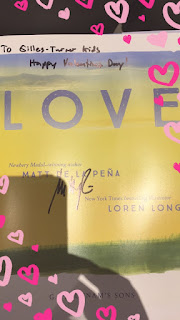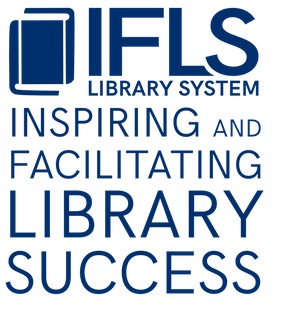Many thanks to Jenna Gilles-Turner, who attended the Hubb’s Children’s Literature Conference this month and submitted this reflection on her experience.
I attended the 26th annual Hubb’s Children’s Literature Conference at St. Thomas University in Minnesota on February 17. It was by far the most meaningful literature conference I have been to. The keynote speakers were Matt de la Peña and Nancy Carlson.
Matt de la Peña eloquently spoke about his transition from boyhood to manhood in a Mexican-American community just north of the Mexican border. His YA novels study working class boys – the beauty and blindspots of becoming a man. His speech was full of humor, life, and the power of reading/books. Books, for him, became the secret place to feel after growing up in a community of men who were told and shown not to show emotion. Matt also spoke of a writer’s journey. Writing is exploration and evolution. He finished his key note speech by reading aloud his latest (and one of my favorites from the past year) picture book, Love. That in and of itself was worth the journey over to the Cities.

Nancy Carlson spoke mainly about her journey as an artist into picture book writer. She also spoke about her journey as a wife of somebody who suffered from and succumbed to an early onset brain degenerative disease. Personally, her artistic style has never stood out for me and her books tend to be somewhat didactic. They have their place and I appreciate them in very specific circumstances. I gained a deeper understanding and joy regarding her books after her speech. Carlson had slides of individual of books and book pages, talking us through exactly why she drew what she did. I have recommended her books to families and educators in the past and will continue to do so with more passion. Her desire to reach and help children from all backgrounds is inspiring. The main messages from Carlson’s keynote speech were: Everyone has stories to tell even if they don’t think they do and Tough times are journeys – books, writing, and art are deeply beneficial and also personal for both the creator and the user.
The first breakout session I attended was Education for Social Change with Dr. Artika Tyner. If you’d like to see for yourself her incredible passion, power, and knowledge, you can watch Dr. Tyner’s Tedx Talk:
https://everydaypowerblog.com/2016/02/10/education-for-social-change/. She discussed the inspiration and purpose surrounding her picture book,
Justice Makes a Difference. We discussed cultural awareness, identity development, leaders as learners, leadership, and legacies. I came away from her session with renewed inspiration, passion, authenticity, and validation. “A leader is a planter – a planter of ideas, seeds of change, and a vision for justice,” – Dr. Tyner. We must utilize our social justice lenses in our schools, libraries, and community centers to make sure everyone feels welcome, valued, and heard in regards to identity and cultural differences.
The second break-out session was with Marian Hassan, where Hassan and attendees shared stories about the power of global literacy. She showcased a few of her favorite global literacy-minded books for preschool elementary aged youth, all of which I am proud to say I have used in storytime, with my family, and/or we have in our collection. Global literacy is an understanding of how the world is organized and interconnected and the possibilities and constraints facing its peoples. Global literacy allows us to think critically about the world and the roles in it. It helps you be more approachable and open to experiences, make connections, and be in tuned to what has been and is going on in the world. A powerful example she shared from her own life was when she worked for school districts on kindergarten readiness. One of the items on their home visit checklist was regarding use of utensils. Many families come from cultures where Western utensils are not used. They may use chopsticks or eat with their hands. The cultural blindness of our institutions can be stunning. Global literacy at an early age can help mend these disconnects on individual and global levels.



